
Carl Lee Perkins was an American guitarist, singer and songwriter. A rockabilly great and pioneer of rock and roll, he began his recording career at the Sun Studio, in Memphis, beginning in 1954. Among his best-known songs are "Blue Suede Shoes", "Honey Don't", "Matchbox" and "Everybody's Trying to Be My Baby".
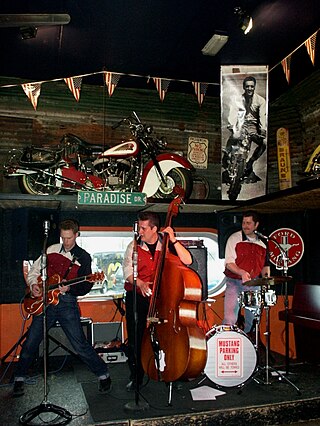
Rockabilly is an early style of rock and roll music. It dates back to the early 1950s in the United States, especially the South. As a genre, it blends the sound of Western musical styles such as country with that of rhythm and blues, leading to what is considered "classic" rock and roll. Some have also described it as a blend of bluegrass with rock and roll. The term "rockabilly" itself is a portmanteau of "rock" and "hillbilly"; the latter is a reference to country music that contributed strongly to the style. Other important influences on rockabilly include western swing, boogie-woogie, jump blues, and electric blues.
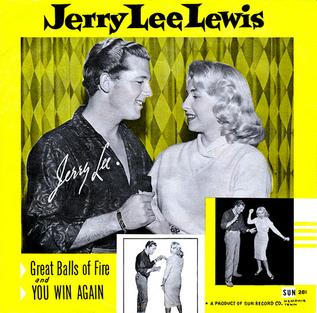
"Great Balls of Fire" is a 1957 popular song recorded by American rock and roll musician Jerry Lee Lewis on Sun Records and featured in the 1957 movie Jamboree. It was written by Otis Blackwell and Jack Hammer. The Jerry Lee Lewis 1957 recording was ranked as the 96th greatest song ever by Rolling Stone. The song is in AABA form. The song sold one million copies in its first 10 days of release in the United States making it one of the best-selling singles in the United States at that time.

"Folsom Prison Blues" is a song by American singer-songwriter Johnny Cash. Written in 1953, it was first recorded and released as a single in 1955, and later included on his debut studio album Johnny Cash with His Hot and Blue Guitar! (1957), as the album's eleventh track. Borrowing liberally from Gordon Jenkins' 1953 song, "Crescent City Blues", the song combines elements from two popular folk styles, the train song and the prison song, both of which Cash continued to use for the rest of his career. It was one of Cash's signature songs. Additionally, this recording was included on the compilation album All Aboard the Blue Train (1962). In June 2014, Rolling Stone ranked it No. 51 on its list of the 100 greatest country songs of all time.
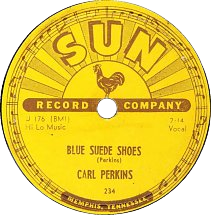
"Blue Suede Shoes" is a rock and roll standard written and first recorded by American singer, songwriter and guitarist Carl Perkins in 1955. It is considered one of the first rockabilly records, incorporating elements of blues, country and pop music of the time. Perkins' original version of the song appeared on the Cashbox Best Selling Singles list for 16 weeks and spent two weeks at the number two position.
"Pledging My Love" is a blues ballad. It was written by Ferdinand Washington and Don Robey and published in 1954.
"Cry! Cry! Cry!" is the debut single by singer-songwriter Johnny Cash. The song was originally released in 1955 and reached number 14 on the Best Sellers charts.

"I Forgot to Remember to Forget" is a 1955 rockabilly and country song, first recorded by Elvis Presley written by Stan Kesler and Charlie Feathers. It was Elvis' first no. 1 record nationally. The single was the fifth and final single released on Sun Records before Elvis moved to RCA Records.
Carl Richard Mann was an American rockabilly singer and pianist from West Tennessee. He was referred to as "The Last Son of Sun", as he was one of the final artists introduced by Sam Phillips of Sun Records.
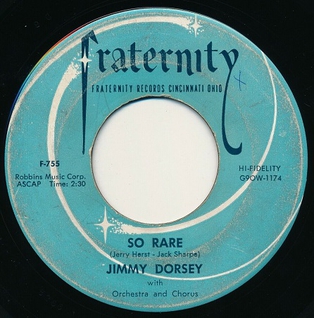
"So Rare" is a popular song published in 1937 by composer Jerry Herst and lyricist Jack Sharpe. It became a hit for Jimmy Dorsey in 1957.

"Paralyzed" is a 1956 song recorded by Elvis Presley for his album Elvis. The song was recorded on September 1, 1956, and has been well received by music critics. The song was written by Otis Blackwell, with Elvis receiving partial song-writing credit.

Ricky is the debut album by American actor and rock and roll musician Ricky Nelson, released in November 1957. The album topped the Billboard's Top LPs chart, becoming the first solo artist to chart under the age of 18.

"Daddy Sang Bass" is a song written by Carl Perkins, with lines from the chorus of "Will the Circle Be Unbroken?", and recorded by American country music singer Johnny Cash. It was released in November 1968 as the first single from the album The Holy Land. The song was Cash's sixty-first release on the country chart, going on to No. 1 on the Billboard country chart for 6 weeks and spending a total of 19 weeks there. The single reached No. 56 on the Cashbox pop singles chart in 1969. "Daddy Sang Bass" was also released on the Columbia Records Hall of Fame Series as a 45, #13-33153, b/w "Folsom Prison Blues". The record was nominated in the CMA awards category of Single of the Year by the Country Music Association (CMA) in 1969.

"Dixie Fried" is a 1956 song written by Carl Perkins and Howard "Curley" Griffin and released as a single on Sun Records. The song was released as a 45 and 78 single, Sun 249, in August, 1956 backed with "I'm Sorry, I'm Not Sorry". The single reached no. 10 on the Billboard country and western chart in 1956. The single was also released in Canada on the Quality label as #1557. The record was reissued as a 45 single in 1979 on the Shelby Singleton-owned Sun Golden Treasure Series as Sun 10.

"Your True Love" is a 1957 song written by Carl Perkins and released as a single on Sun Records. The single was released as a 45 and 78 backed with "Matchbox" in February, 1957. The recording, Sun 261, reached no. 13 on the Billboard country and western chart and no. 67 on the Billboard pop singles chart that year. The song was recorded on Tuesday, December 4, 1956 when Elvis Presley made a surprise visit to Sun Studios at 706 Union in Memphis, Tennessee. Johnny Cash and Jerry Lee Lewis also participated in the impromptu jam session that day known as the Million Dollar Quartet. Jerry Lee Lewis also played piano on the recording.

"Birth of Rock and Roll" is a 1986 song written by Carl Perkins and Greg Perkins. The song was featured on the Class of '55 album which included performances with Johnny Cash, Roy Orbison, and Jerry Lee Lewis. "Birth of Rock and Roll" was released as a 7" single with a picture sleeve, 885 760–7, on the Smash/America label copyrighted by PolyGram Records produced by Chips Moman. The single reached No. 31 on the Billboard country chart and No. 44 on the Canadian country chart in 1986. The B side was "Rock and Roll (Fais-Do-Do)" which featured Johnny Cash, Jerry Lee Lewis, and Roy Orbison. The theme of the song “Birth of Rock and Roll" is about how "Memphis gave birth to rock and roll" in the 1950s at Sun Records. A video of the song was also made featuring Carl Perkins, Jerry Lee Lewis, and Ronnie Wood of The Rolling Stones as they drove to the historic Sun studios in Memphis, Tennessee in a white Cadillac convertible.
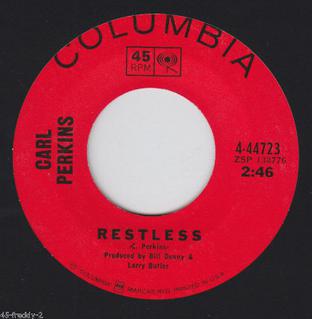
"Restless" is a 1968 song written by Carl Perkins and released as a single on Columbia Records.
"Chains Of Love", a 12-bar blues, was written by Doc Pomus.
"Swayin' to the Music (Slow Dancin')", initially titled "Slow Dancing", is a song written by Jack Tempchin. Under the title "Slow Dancing", the song originally was a minor US hit in 1976 for the band Funky Kings (of which Tempchin was a member). The song became much better known as "Swayin' to the Music (Slow Dancin')" in a 1977 cover version by Johnny Rivers, which became a top ten US hit. It was Rivers' last Top 40 hit in the United States, and became his second Gold record.
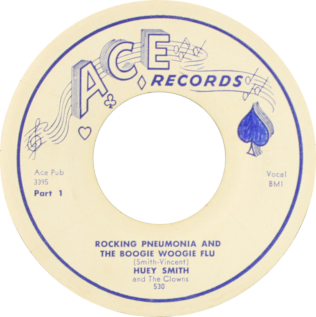
"Rockin' Pneumonia and the Boogie Woogie Flu" is a song written and originally recorded by Huey 'Piano' Smith in 1957, who scored a minor Billboard hit with it, peaking at No.52 on the Top 100 chart, and a more successful No.5 on the Most Played R&B by Jockeys chart.














